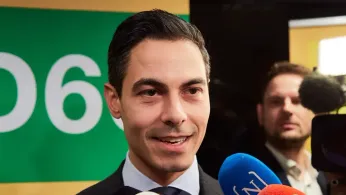
Nov 3
Rob Jetten: The Netherlands’ New Prime Minister Shatters Ceilings—and Brings the Rainbow with Him
READ TIME: 4 MIN.
History has a new face in The Hague—and it’s one that wears its rainbow with pride. Rob Jetten, the fresh-faced leader of the Democrats 66 (D66) party, has stepped into the role of Prime Minister, becoming one of the most prominent openly gay heads of government in the world. It’s not just another page in the history books; it’s a vivid, living testament to how far queer visibility and leadership have come—and to how much possibility still lies ahead .
At just 37, Jetten is already a veteran of Dutch politics, but his story is one that LGBTQ+ people everywhere can see themselves in: a journey from the small town of Uden to the highest echelons of power, marked by authenticity, resilience, and a refusal to shrink himself to fit anyone else’s expectations .
Born in 1987 in North Brabant, Jetten’s early life was shaped by the multicultural, sometimes turbulent, realities of modern Dutch society. He’s spoken candidly about how events like the murder of filmmaker Theo van Gogh and the resulting tensions left their mark on his worldview, pushing him toward a vision of “Opportunities for all”—a motto he’s carried from his days as a student at Radboud University to his early career at ProRail and onwards to the national stage .
But what sets Jetten apart isn’t just his age, his technocratic polish, or his policy chops. It’s the way he’s always refused to compartmentalize his identity. In a landscape where queer politicians are often told to keep their sexuality quiet, Jetten’s outspokenness is both radical and refreshingly matter-of-fact—a signal to LGBTQ+ youth that they, too, can dream big and lead boldly .
Jetten’s political rise has been fast and, at times, contentious. At 31, he became the youngest-ever parliamentary leader of D66, facing skepticism from the old guard but never letting it dull his ambition or authenticity . He’s weathered the media scrutiny and the “Is he too young? Too radical? Too gay?” headlines with an easy confidence and sense of humor that’s become something of a signature.
His leadership has spanned the climate and energy portfolio—where he championed a €750 million investment in a national hydrogen network—as well as stints as Deputy Prime Minister and a brief tenure as acting Minister of Finance . Jetten’s willingness to form unexpected coalitions, even dubbing one a “self-named ‘unholy alliance’” to fight education cuts, shows a leader who’s not afraid to get creative for his principles and his people .
The queer lens is never just about who’s in the room—it’s about who gets to dream, who gets to see themselves reflected in the corridors of power. Jetten’s appointment matters for every Dutch queer kid who’s been told to “tone it down,” for every trans activist fighting for recognition, and for every rainbow family still waiting for the world to catch up. His leadership is a statement: Pride is not a parade, it’s a presence.
Jetten follows in the formidable footsteps of other out leaders, but his rise comes at a moment when LGBTQ+ rights are under pressure in many parts of Europe and beyond. His visibility sends a message that queerness and leadership are not mutually exclusive; they are, in fact, a source of strength .
He’s also a product of a Dutch society that, while far from perfect, has long positioned itself at the vanguard of LGBTQ+ rights. The Netherlands was the first country to legalize same-sex marriage in 2001, and Jetten’s ascent is a reminder that progress is not a straight line—but when queer people lead, the line gets bolder.
Jetten’s politics blend the pragmatic with the principled. He’s pushed for climate action, advocated for increased defense spending in response to global instability, and insisted that Dutch society can’t afford to be complacent about its freedoms .
Yet his queerness isn’t just an asterisk on his résumé—it’s an active ingredient in his vision for a more inclusive, resilient society. He’s spoken about the hate and intimidation faced by his predecessor, Sigrid Kaag, and about his own experiences navigating public life as an out gay man . For many in the LGBTQ+ community, this candor is more than refreshing; it’s necessary.
To LGBTQ+ people everywhere, Jetten’s new role is as much about hope as it is about policy. It’s about seeing a leader who doesn’t just tolerate diversity, but embodies it. At a time when anti-LGBTQ+ rhetoric is rising in some corners of Europe, his appointment is a beacon—a reminder that queer people are not just part of the conversation, but are writing the headlines.
Whether he’s navigating coalition wrangling in the Dutch Parliament or turning up at Pride with a smile and a sense of solidarity, Jetten’s leadership stands as a challenge to the status quo: When queer people step into the light, the whole landscape changes.
Rob Jetten’s Prime Ministership is more than a personal milestone. It’s a cultural shift, a message to every LGBTQ+ person who’s been told to wait their turn or shrink their dreams. The rainbow isn’t just on the flag outside the Parliament—it’s in the very fabric of Dutch political life. And for queer communities at home and abroad, that’s something worth celebrating, defending, and building on for generations to come.






